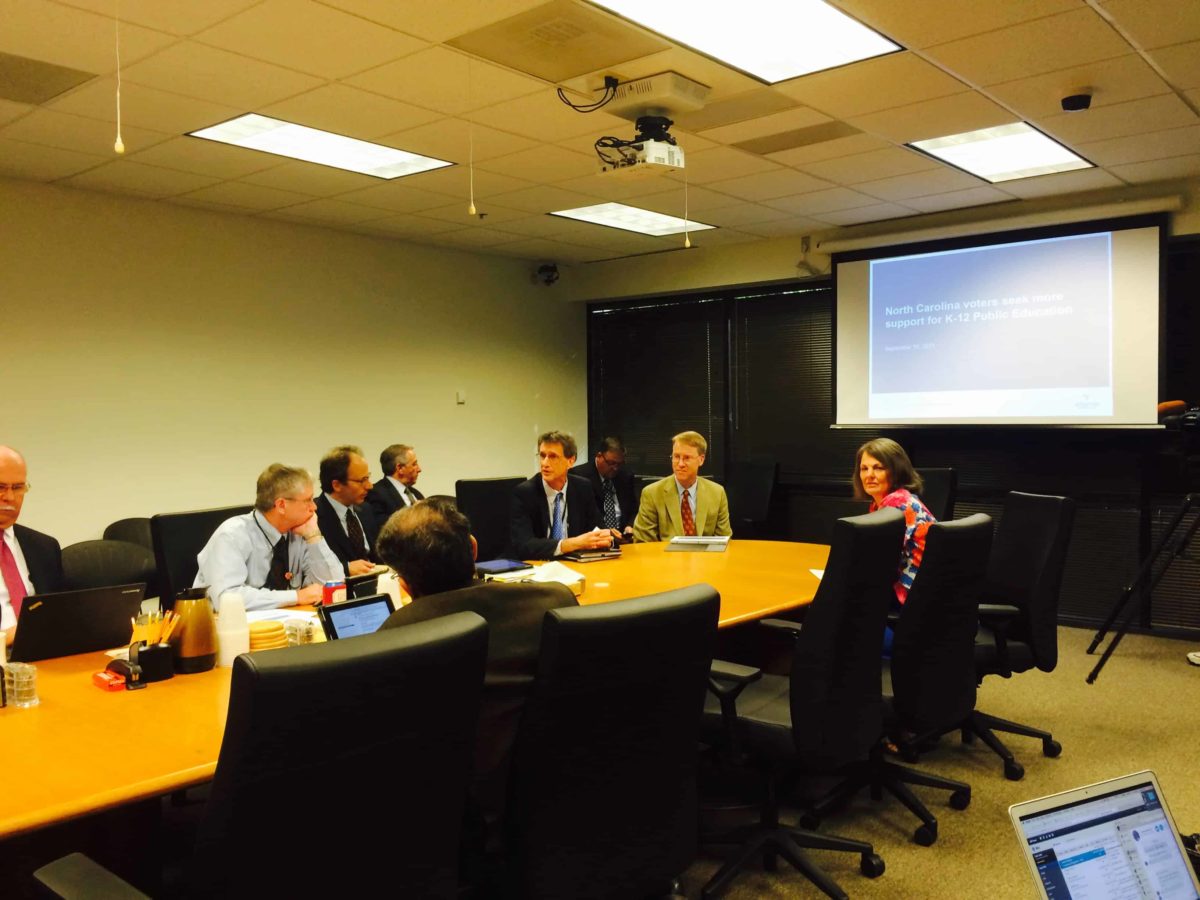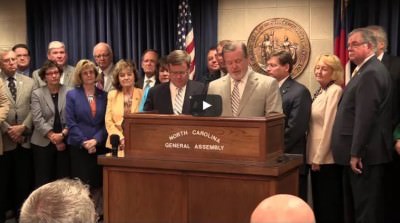

Voters in North Carolina have great faith in public schools but worry that state policy and funding are damaging the ability of the schools to prepare children for their future.
That’s according to an April 2015 survey that details how voters perceive public education in the state.
Representatives of the Z. Smith Reynolds Foundation, which commissioned the survey, and the Neimand Collaborative, which carried it out, presented their results to the Wake County Board of Education on Tuesday. It was based on responses from 1,235 state voters between April 16 and May 16 of this year. Report materials say the sample was “representative of the state census population with regards to race, urban/rural resident and presence of school-aged children in the household.” The report materials also said that voters self identified themselves on social issues, with 29 percent saying they were conservative, 45 percent moderate, and 26 percent liberal.
Leslie Winner, executive director of the Z. Smith Reynolds Foundation, said she was spurred to do the survey — which first took place in 2013 — because of actions from policymakers. She recalled 2011, when she says the legislature cut a hefty portion of the public education budget.
“And there really wasn’t as much pushback from that as I might have expected,” she told the Wake Board.
Her surprise led her to decide it was important to know how voters felt about public education and why.
The most recent findings of the survey show that when it comes to supporting public schools, voters feel good.
Overall, 85 percent said public education is extremely important and 80 percent said it’s extremely or somewhat beneficial. The numbers for the 2013 survey were 93 and 85 percent respectively.
But while voters may think public education is important, most of them have a general sense of unease about it.
The survey found that 59 percent think K-12 education is “On the Wrong Track.” That percent is up 11 percent from the same survey conducted in 2013.
The survey data was also broken down according to political preference and found that 70 percent of liberals — up from 44 percent in 2013 — think the state is “On the Wrong Track.” Fifty four percent of moderates agree, up from 44 percent in 2013. And 56 percent of conservatives also agree, only up one percent from 2013.
The survey found that the particular reasons for this concern vary, though the state budget, policy, and requirements are the broad reasons most often given.
The voters said critical areas of public education to improve were:
Underpaid teachers: 62 percent
Inadequate funding: 50 percent
Class size: 44 percent
Curriculum: 40 percent
Dave Clayton, executive vice president of the Neimand Collaborative, pointed out to the Wake County Board of Education that these are all factors out of their control.
Winner said the onus has been put on the state to fix public education.
“A lot more of the blame has shifted from the local school systems…to the state level,” she said. “Doesn’t mean that you guys are off the hook, but it’s more like they’re also on the hook.”
The survey results do indeed show that state elected officials and leaders are getting the blame from the voters surveyed.
Thirty nine percent put the onus on the state legislature for underpaid teachers, while 24 percent blamed the governor. When it came to inadequate funding, 49 percent fault the state legislature and 23 percent think it’s the governor’s fault.
Clayton said that when it comes to political views, the concern that unites voters is lack of funding for public education. Eighty percent of total voters agreed with the statement: “State policies and funding are putting greater burdens on our local schools and giving them fewer resources to educate our students.”
“That’s as strong a number as you see,” he said.
And it held mostly true no matter the voter’s political persuasion. Seventy four percent of conservatives, 80 percent of moderates, and 87 percent of liberals agreed.
Charter schools and opportunity scholarships came in for quite a bit of criticism in the survey. Seventy five percent of voters said public tax dollars shouldn’t go to “exclusive” private schools, and 73 percent said that public money shouldn’t go to private schools period. Seventy one percent said they shouldn’t go to for-profit companies operating charter schools.
And if North Carolina students are going to use opportunity scholarships for private schools, or if they attend charter schools, voters think those schools need to have the same accountability as public schools.
Seventy one percent said it was important that the state require the same “measures and level of accountability for student performance,” from charters and private schools that get tax money. Seventy percent said charter schools should have the same accountability for “curriculum, teacher quality and student performance as traditional schools.”
That is somewhat at odds with the reason some voters identified as an issue for public education. Twenty two percent said testing — including teaching to the test and over testing — is problematic. But testing is the state’s chief tool for accountability.
“There’s that tension that you’ve got to navigate,” Clayton said.
As to the future of public education in North Carolina, voters are mixed. Twenty percent said they strongly agreed that they were confident public schools are the best option. Thirty four percent somewhat agreed. But 32 percent somewhat agreed that they lacked confidence in public schools as the best option, and 14 percent strongly agreed.
But even if public education continues to be a strong force in the state, most voters think charter schools will play an essential role.
Sixty percent said they think charter schools are an important option for children not served well by the public schools.
To see the data, presentation, summary and talking points associated with the survey, go here.
Editor’s Note: The Z Smith Reynolds Foundation is a funder of EducationNC


